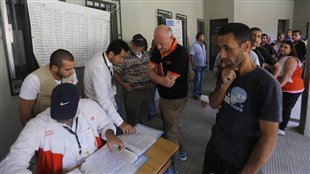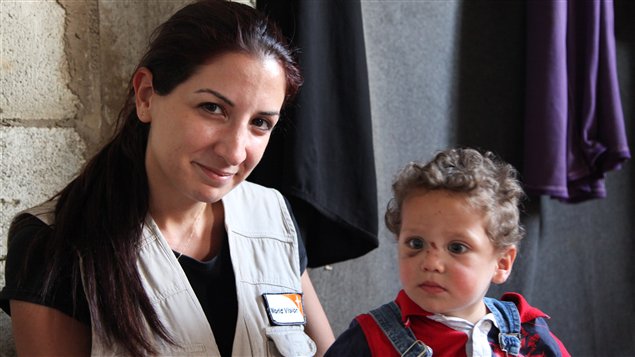A devastating bomb attack on UN headquarters in Baghdad killed 22 aid workers ten years ago and is remembered on this, World Humanitarian Day. Danger has increased for aid workers.
Just last week, the emergency health organization, Médicins Sans Frontières (Doctors Without Borders) pulled out of Somalia as a result of “extreme attacks on its staff.”

Syrian refugee families in Lebanon’s Bekaa Valley in June.
© World Vision Canada
Aid workers increasingly targeted
“In particular in conflict situations you have a wide range of risks,” says Bart Witteveen, World Vision Canada’s Director of Humanitarian and Emergency Affairs. “There’s being in the wrong place at the wrong time type of risk, getting caught up in crossfire. But more and more you’ll find that humanitarian aid workers, to a certain extent, are being targeted; being caught up in ambushes, in some cases being kidnapped.”
Negotiating with the parties to the conflict can mitigate some of the risk. “We try to influence their perception of the work that we’re doing,” says Witteveen, “convincing them that we are not party to the conflict, that we are impartial, that we don’t sympathize with one group over the other, that we are responding to needs alone.”
It’s vital to work with communities too, to get their endorsement or protection to minimize risk, says Witteveen.
“Heartbreaking, frustrating” at times
Asked whether it’s heartbreaking to come under attack when one is trying to help, Witteveen says “You say heartbreaking, it’s also frustrating, (and) it can be quite dramatic when teams have to evacuate an area of high need. These are frustrations that are difficult to deal with…but you have to be realistic about the risks.”
Natural disasters also pose risks for aid workers who face the same dangers as the people they are helping, whether they are from earthquakes, hurricanes, or other catastrophic events.

humanitarian worker. © World Vision
Rewards profound
The rewards of humanitarian work can be profound. Witteveen recalls a time when he and a team were finally able to reach an isolated region of Liberia where thousands of small children were starving to death. They were able to bring in food aid. The children’s health improved quickly and, within a few weeks, they were almost back to their normal state. “Those are really moments when you understand why you’re doing all of this.”
On this, World Humanitarian Day, Witteveen asks that people take a moment to recognize that “there are millions of people every day that are facing humanitarian crisis, today, tomorrow, every day… they are facing huge challenges to survive and to maintain their dignity.”
He also asks that people recognize the hard work and sacrifices that humanitarian aid workers are making every day and, in particular, to remember those who have given their lives in this effort.







For reasons beyond our control, and for an undetermined period of time, our comment section is now closed. However, our social networks remain open to your contributions.